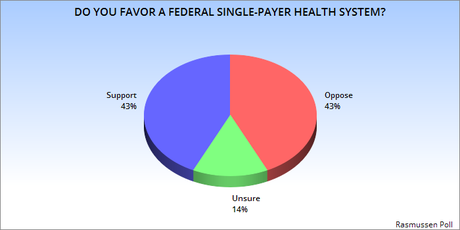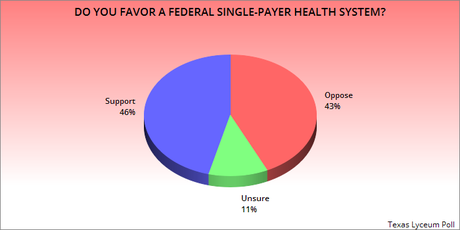
The chart above is from a new Rasmussen Poll -- done on July 25th and 26th of a nationwide sample of 1,000 likely voters, with a 3 point margin of error.

This chart shows the results of a new Texas Lyceum Poll -- done between July 9th and 25th of a sample of 1,178 adults in Texas.
Just about a decade ago, when Democrats were trying to craft a plan to improve healthcare in the United States, the idea of a single-payer government run healthcare system was not very popular. A majority of Americans were clearly opposed to the idea (labeling it as socialism).
But there's been a lot of water under the bridge since then. Obamacare (the Affordable Care Act) made things a bit better, but failed to provide all Americans with health insurance and did not control the costs of insurance or medical care. The Republicans promised to do better. Instead, they just destroyed the little good that Obamacare had done, leaving millions more people without health insurance while insuring that insurance premiums skyrocketed (and medical care costs continued to rise).
It has become obvious to many Americans that the Democrats were too timid to do what was necessary to provide healthcare for all people, and the Republicans simply don't want to do it. They still believe healthcare is not a right, but a product to be sold only to those who can afford it.
This has resulted in more and more people starting to realize that the best and most efficient plan to deliver healthcare for all Americans would be a government-run single-payer healthcare system -- similar to a Medicare-for-all plan.
As the top chart shows, the nation is now split right down the middle -- with 43% approving of single-payer and 43% opposing it. And that's from Rasmussen -- a poll normally very kind to Republicans. Those numbers would have been unheard of a decade ago.
And it's not just blue states where the idea of a single-payer system is growing in acceptance. The second poll is from the red state of Texas, where 46% approve of single-payer and 43 disapprove.
It's probably going to have to grow a little more in acceptance before politicians will seriously consider it (probably to around 60%). But I think that will happen. The public's opinion is moving in that direction.

